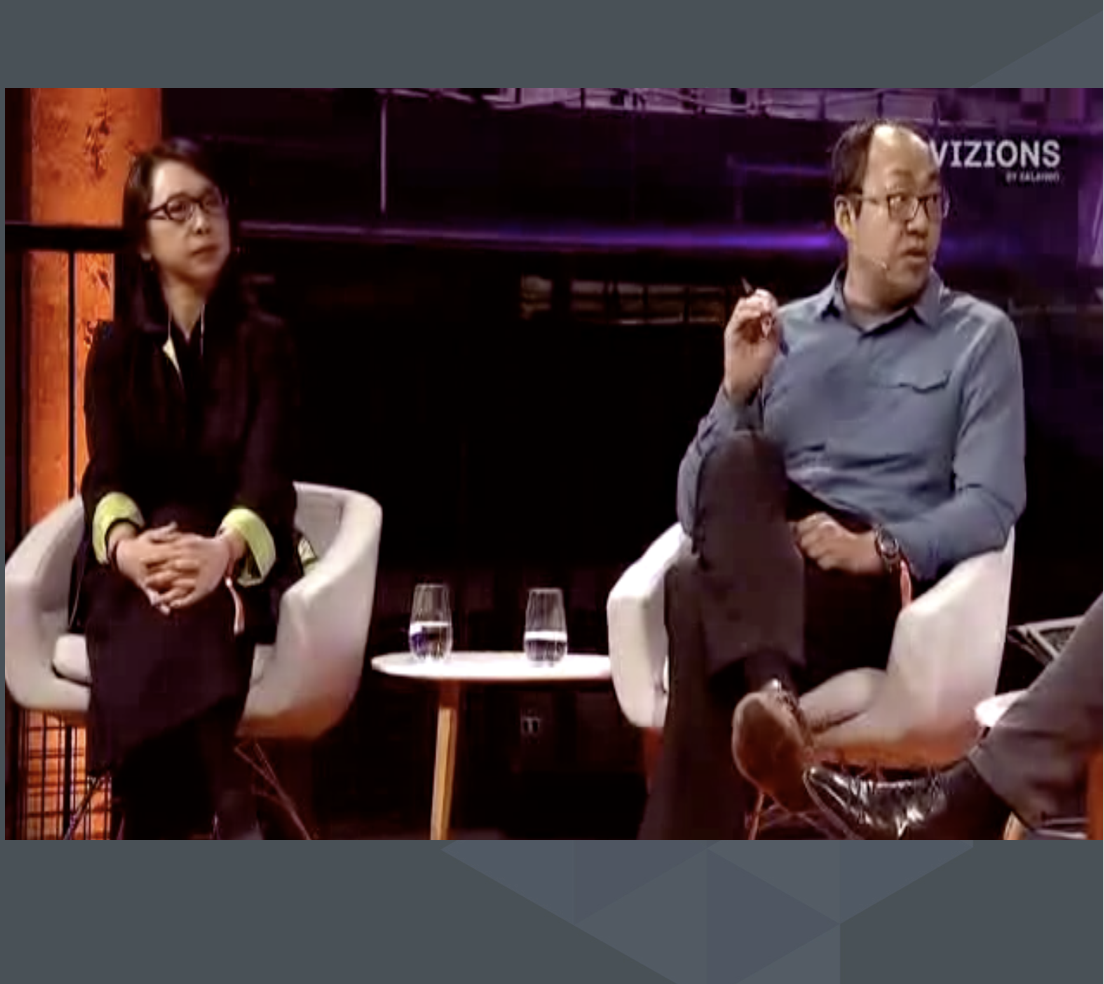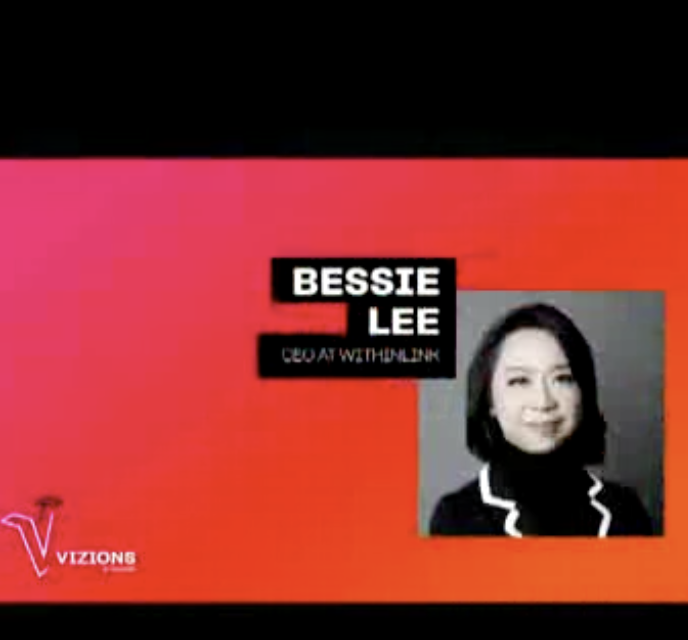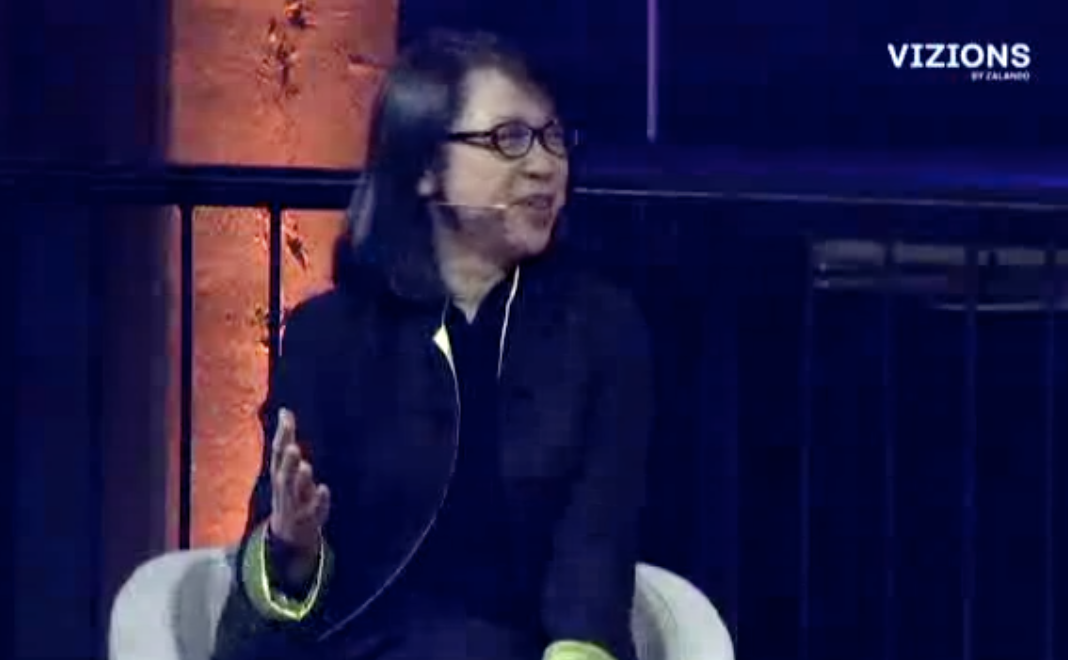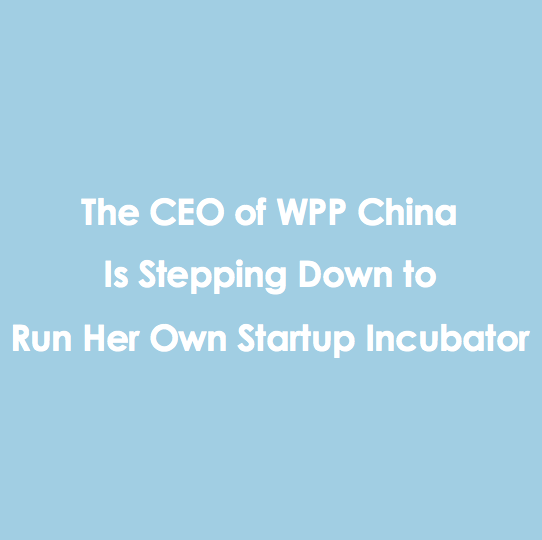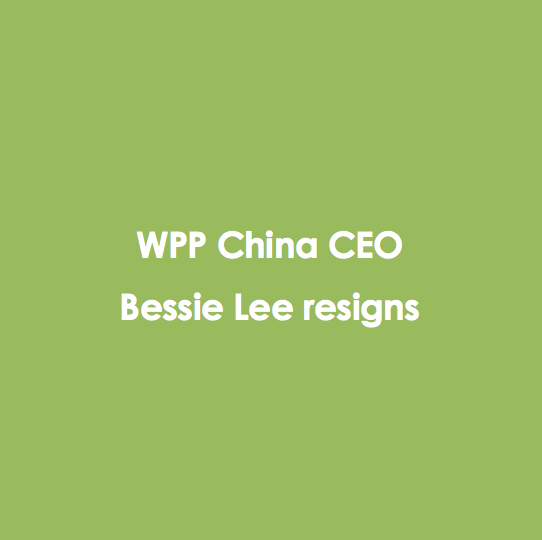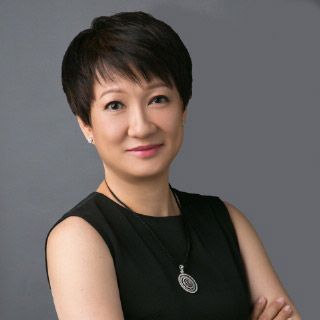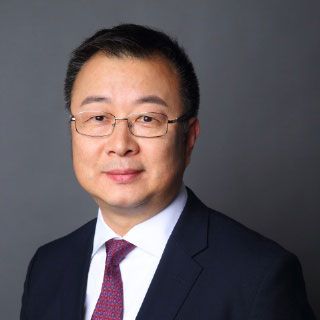Bessie Lee speaks at Vizions: The Platform Stack-Connecting the Online and Offline
Bessie Lee speaks at Vizions 2017-The Next Era of Connectivity
The CEO of WPP China Is Stepping Down to Run Her Own Startup Incubator
-By Angela Doland, Advertising Age, Published on April 20, 2017-
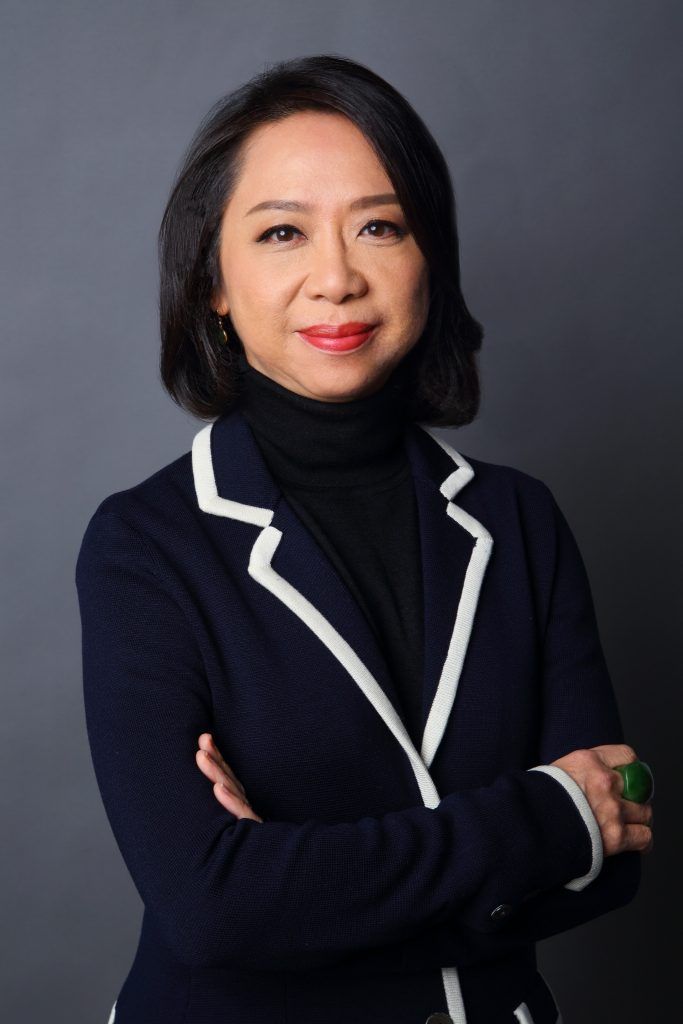
Bessie Lee, the CEO of WPP China, is resigning to focus full-time on a company she founded, a startup incubator and early-stage venture fund investing in areas like mobile advertising, big data, analytics and social media.
Lee founded China-based Withinlink in 2015 and has been splitting her time 60-40 between WPP and her entrepreneurial project. Withinlink recently closed an inaugural fund of 55 million yuan (about $8 million), with investors including media executives, wealthy individuals and government bodies.
WPP said Patrick Xu, the current CEO of GroupM China and a former marketer with Mondelez, P&G and Danone China, will add the WPP CEO job to his role starting May 2, after Lee’s departure.
China, a country of 731 million internet users, has a dynamic startup community that has attracted interest from international agencies; Publicis Media, for example, is a partner of Chinaccelerator, a startup accelerator in China operated by venture fund SOSV. While many agency execs inside and outside China are angel investors or mentors for startups, Lee’s move to set up an incubator and VC fund is more unusual.
Lee is among the most influential execs in China’s ad industry, which barely existed before the 1980s but is now the No. 2 ad market worldwide. Now she is starting an entrepreneurial second act to capitalize on Chinese strengths in the highly-competitive areas that are the industry’s future. And she’s not the only one. Thomas Mok, one of China’s first creative leaders, left his job as chairman of McCann Worldgroup China this month to found a hotshop called Match to develop young creative talent in China.
A native of Taiwan, Lee has spent 27 years in media; she headed GroupM in China for seven years before taking over in 2013 as CEO of WPP China, whose companies including affiliates generate $1.6 billion in revenues. WPP employs almost 14,000 people in China.
Lee launched Withinlink while still at WPP to test if the model of a marketing-savvy incubator would work. “We have never gone out to promote Withinlink because of me wearing two hats, I always tried to be sensitive about it,” she said. But there was interest, including from traditional Chinese advertising companies wanting help with digital transformation. That part of the business was unexpected, but Withinlink has four or five such clients now.
Ms. Lee, a 2013 Ad Age Woman to Watch China, sees a strong future for marketing-related tech startups in China, which has four times the population of the U.S. but is still a much smaller ad market. GroupM estimated U.S. ad spending last year of $178.8 billion, compared to $80 billion in China.
“I think there’s still a lot more potental to be realized,” she said. “Even though marketing tech in the U.S. might be slowing down a bit, in China I keep seeing more and more.”
China’s central government has actively promoted startups to boost the economy through innovation, and local governments are even helping fund them.
Withinlink has a staff of 12, including several former WPP executives. Its chief strategy officer is Annie Hsiao, former president of WPP’s Maxus China and an Ad Age Media Maven in 2015 for her successful outreach to Chinese brands.
Withinlink’s investments include FugeTech, a trading desk and data exchange platform, Pingcoo, which works on mobile advertising solutions, and RabbitPre, which tracks user engagement on digital creative.
Withinlink plans to raise a second, U.S. dollar fund to help Chinese companies and also U.S.-based startups whose offerings have potential in China. The existing fund is “not big” for the China market, as she says, but Withinlink’s staff all have marketing and ad industry experience, something many VCs lack. “We know how it’s done, the pain points, the pressures clients and agencies are constantly under,” she said.
独家|李倩玲创业 离开WPP !未来比想像更快!
Original 2017-04-20 媒介360内容中心 媒介360
4月20日,李倩玲宣布卸任WPP 集团中国区首席执行官一职,接下来将专注投入碚曦投资管理集团(Withinlink)的工作。
碚曦投资由李倩玲女士创办,是一家专注于营销科技领域的新兴企业孵化器和早期风险投资机构,总部位于上海。

碚曦投资管理集团,这家由李倩玲本人在2015年创办的投资管理公司,专注于营销科技领域新兴企业的孵化,同时募集和管理早期风险投资基金。
对于此次投身创业,李倩玲表示“随着中国进一步迈入数字时代,发展势头已经从大企业转移到新兴企业和创业者,打破常规、积极创新、创办公司已是大势所趋,我也身体力行投身革新的浪潮。”
未来的世界来的比想象的快!
李倩玲对于新商业、新科技的关注,已经由来已久。早在2016年媒介360”新商业生态营销变革”的戛纳专场中,她就表示新科技带来的新玩法,对未来的新商业生态变革、对媒体定义、内容应用等方面都将产生巨大的影响。
而不久前,李倩玲在媒介360第四届营销传播奖战略终审畅享会上,第一时间分享了《未来的世界来的比想象的快!》的主题进行演讲,她提出现在技术发展有三点大趋势:
1、硬件与软件的条件升级速度越来越快;
2、低阶人工智能发展速度比想象的快;
3、语音助理/语音控制越来越普及,目前亚马逊的Alexa市占率相当高,但是谷歌、索尼、日本的社交媒体Line急起直追。
在展示解析了当下市场最前沿的一些科技产品之后,李倩玲针对硬件驱动产品变革、电视终端发展、语音助理/语言控制、人工智能、游戏、虚拟现实、智能家居等方面,分享了自己的深刻洞察。
演讲最后,李倩玲表示,未来的世界已经在转角等着我们了,我们需要更多地关注科技及其发展,了解它们是如何影响未来的市场营销。
营销科技领域的下一站
在过去的两年内,碚曦投资已经在天使轮阶段投资了十余家中国本土的新兴企业,涵盖移动广告、大数据分析、社交媒体和物联网等领域。

其中包括移动广告服务商宾酷网络、程序化交易桌面及数据交易平台复歌科技、儿童智能硬件高科技公司巨鲸网络科技(Gululu)、智能零售的线下大数据平台芝麻科技、社交媒体用户互动监测和管理系统WeTalk、高品质内容平台造就、网红和新媒体搜索引擎及广告平台Robin8、场景营销数据化服务平台兔展。
最后,祝福李倩玲创业顺利,追梦路上越走越远,充分释放创新能量,更好地探索未知世界!
更多李倩玲独家观点集萃
未来的世界已经在转角等着我们了,我们需要更多地关注科技及其发展,了解它们是如何影响未来的市场营销。
戛纳中国专场实录:newEco innovative 新商业生态营销变革
新的科技“玩具”将出现、与智能手机结合给到互联网和移动终端用户全新的“第一人称”的体验——机器人、VR虚拟现实终端和内容。
“新商业生态,我的理解是在原有基础上,再往上叠加一层。或者去颠覆原有的,再找到一个新模式。”Bessie认为,这两者都存在。而她也是一个参与者,但不是一个布道者。
“青春化,最重要是建立一个有效的持续对话机制。”要想获得年轻消费者的青睐,最有效的方法就是在和年轻人的对话中,了解他们的喜好和生活习惯。
在WPP待了27年,李倩玲要全身心去创业了 | 独家专访
Original 2017-04-20 麦迪逊邦 创意邦
4月20日,李倩玲(Bessie Lee)正式卸任WPP集团中国区首席执行官,离开这家已经效力了27年的集团,转换职业身份,全身全心投入成为一名创业者。
碚曦投资管理集团(Withinlink)就是她职业生涯的下一站,这家由李倩玲本人在2015年创办的投资管理公司,专注于营销科技领域新兴企业的孵化,同时募集和管理早期风险投资基金。据悉,在短短两年的时间内,碚曦投资已经投资了10余家营销科技领域新兴企业,并已实现了超十倍增值。

在正式宣布卸任前一周,麦迪逊邦与这位曾先后掌舵传立中国、群邑中国、WPP中国区的广告女王坐下来做了一次独家对话,谈谈她的职业轨迹转变始末,并且也将一探其对营销行业走向的预期,聊聊她对AdTech公司的判断及投资标准。
从大象骑手到初创企业保育员
2013年初,李倩玲卸任了执掌7年的群邑中国首席执行官之职,并走马上任WPP中国区首席执行官。目前,这家世界上最大的传播集团在华拥有1.4万名员工且年收入超过十亿美金。
当我们问及为何不是离开WPP换一家集团/媒介代理公司做高管?李倩玲坦率地回答,“我之前那么多年都在做Agency的运营工作,每天就真的是被琐碎的事情拉着,抽不出身来,所以我觉得当时那样的一个机会不错。运营群邑中国七年之后,我觉得自己不能再专注在公司具体运营这件事,而开始对业界的生态、数字领域的发展这些问题更感兴趣。”李倩玲说。“但是我又知道自己这方面很不足,所以一定要把自己的视野拉大拉高来看,然后才能有更多的时间去接触这些公司。”
“我觉得当时接WPP中国区 CEO这个职位恰到好处,因为这个角色里面有一部分职能,就是帮WPP集团在中国去观察一些潜在的并购或者投资、合资的对象,这刚好可以让我能够进入到那个领域里面。”
不过与我们想象中的全职CEO不同的是,李倩玲向WPP首席执行官苏铭天爵士(Sir Martin Sorrell)提出,希望能以60:40的比例分配自己的时间和精力,用60%的时间去处理WPP中国区事务,而剩下的时间,则去做自己最关注的事情。“当然,我也只领取相当于原来60%的薪水。”李倩玲笑谈道。
据了解,WPP集团在全球十几个业务大区拥有大区业务主管,而不少区域CEO也是兼职的。“我觉得苏铭天爵士也挺好的,大概他自己创业走过来,他也觉得这样的方式不错,所以他就同意我以这样比例分配自己的时间,Part-time做中国区CEO。“
一路小跑,加速成长
这个吸引李倩玲目光的事业,便是营销技术创新公司(AdTech)的投资与孵化。2015年,碚曦投资管理集团正式成立。在这个新的角色定位里,李倩玲并不仅仅把自己当成一个单纯的投资人,还希望可以将自己多年的管理运营经验传递给那些初创企业(start-up),帮他们接触更多广告客户,获得更大和更扎实的成长机会。而对于营销行业的创业者来说,李倩玲的经历与经验甚至比她手中的资本更加宝贵。
“公司第一年成立的时候,我们还没有自己的基金,就是用我25年来攒下来的积蓄来投。”李倩玲回忆到,“很多创业公司其实不是冲着钱来的。”虽然目前中国涌现了众多各类投资机构,但对于广告生态、公关、数字营销的理解以及广告营销预算如何分配等专业问题的认识是不少风投所欠缺的,碚曦投资集结了一群业内拥有丰富实战经验的资深行业高管,为新创企业提供全方位的孵化和辅导。也正是这些无形资产,让碚曦投资能够以更少的金额获得更高的投资份额。
短短两年时间里,这套“投资+孵化”的模式便得到了市场的认可,碚曦投资的成长速度也已经超出了李倩玲当初的设想,投资的新创企业也已经达到十余家。2016年年底,碚曦投资完成首支人民币基金5500万元的全额募集。“说实话这让我有点受宠若惊,没想到短短3个月就可以募集超过预期的规模。而且对于做天使投资来说,这个数量也不算小。”李倩玲表示。未来,除了用战略性资源帮助这些新创企业,碚曦投资将可以有更多资金来对他们进行投资,并能进行更多早期项目的投资。
新公司的快速发展多少让李倩玲有些分身乏术,同时兼顾WPP与碚曦投资的工作变得愈发困难。离开,成了不得不下定的决心。
创业有老伙伴相伴相随
广告圈里离职创业的高管着实不少,但他们往往还是会成立一家广告代理公司,做着老本行,但李倩玲选择成为一名投资人。“如果我再做一家代理公司的话,其实比不过WPP旗下的代理公司,或者市场上其他的代理公司做得更好。现在中国已经有几十万家代理公司了,说实话是不缺我这一个。”李倩玲表示,“所以,那我更应该进入这样一个新的领域,做一些和营销技术相关的投资、管理咨询工作。”
职业的转换必然带来更大的挑战,最先到来的就是一场恼人的考试。为了取得在大陆进行投资的资质,李倩玲和她的团队成员也参加了多项资格考试。“这些考试对他们(年轻人)来讲可能很简单,一次就能过,但我毕竟年纪大了,有一个科目考了两次才通过。”1965年生人的李倩玲不由得感叹岁月不饶人。
其实,碚曦投资的创业团队里并没有太多年轻的面孔,对于广告人来说,还有不少常在行业新闻中得见真容的业界大咖。比如曾担任群邑及华通明略首席人才官的李文海、曾任群邑中国企业传播董事总经理的庄郭瑞玲、曾任迈势中国区总裁的萧静萍等。这支目前由12人组成的创业团队,聚集了多位广告行业资深高管。“12位同事,绝大部分是以前我在群邑曾经合作过的一些伙伴。大家合作过,价值观类似,能够彼此认同,所以就是重新走到一起做些不太一样的事情。”
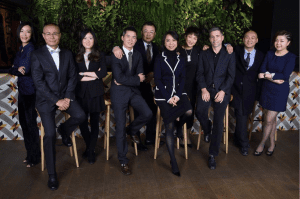
李倩玲透露,碚曦投资在创业第一年便已经实现收支平衡,“当然这和我之前在群邑管理的营业收入相比是少了太多,但自己创业的成就感是很不一样的,觉得很有趣。”第二年,公司便开始小有盈余,李倩玲举例说,“你看,我们就拉着所有团队成员一起到CES消费电子展参观学习。”
在李倩玲的未来蓝图里,碚曦投资将在很长一段时间内保持小团队运作。“我们会把投资的公司当做自己的公司一样孵化。当它足够大,功能越来越健全,就不应该再依附在任何另外一个团队上,就应该让它自由去飞翔,我们就会再去孵化下一家公司。如果是这样运作的话,我觉得我们的团队不需要比现在大太多。”
4A死不死?其实是各自重新寻找定位
“4A已死”这样的说法已在业界流传了很久,但至少现在不少4A还比较滋润的活着。那么,未来的广告行业将会走向何方?“现在这种群雄争霸的混乱局面,实际上是因为在数字化的大环境中,每家公司、每个人都在重新寻找自己的定位。”李倩玲说到。
在李倩玲眼中,无论4A还是本土广告公司,无论传统代理商还是数字技术供应商,甚至一些咨询机构都面临相同的挑战,就是在全新的营销生态中找到自己的位置。“比如一家本土营销集团,通过资本运作纳入了7家做移动代理的公司,这7家的区别在哪儿?要去针对同一个客户展开竞争吗?再比如单纯的咨询机构,只做前段的策略。客户就会困惑,策略做出来之后谁帮我落地?如果落地的效果不好跟咨询公司还没有关系,这不是一个能说服人的逻辑。现在,体量稍微大一些的广告主,可能要同时管理10~15家大大小小不同的代理商,我现在都不知道客户日子怎么过的,好恐怖。”
面对混乱的局面,不少营销代理商已经在积极作出转变。各大代理商都在推进数字化、技术战略,都在强调集团内部业务以及组织的整合。李倩玲在WPP中国区CEO任上,也将很大的精力投入到“如何促成集团内100多家公司之间横向合作”这个课题上。2015年7月,WPP在上海将旗下26家公司、3000多名员工迁入同一栋办公楼,目的就是为了推动集团内的水平整合。今年年初,奥美也正是拉开历史上最大的一次改革的大幕,宣布调整组织架构,提出“one Ogilvy”的目标,提升公司内部的协作整合。
但要走出混乱的局面,仅有这些还不够。“现在的模式里,传播集团、代理商都有自己缺陷的部分。”而李倩玲投资的重点,正是寻找那些能够补足行业缺失的新型营销机构。
Withinlink的未来广阔天空
“在数字化的环境里,我们不能纯粹地做服务。”李倩玲认为,这才是如今代理模式的死穴。“你手上一定要有数据,一定要有技术。另外,还要知道数据与技术结合了之后,怎么去进行实际应用。”现在,没有任何一家公司真正拥有全渠道数据,哪怕像BAT这样的公司,比如腾讯公司拥有海量的数据,但还在消费者线下行为的数据上有所缺失。所以,市场上创新的空间还是非常大。
目前,国内有不少营销技术公司正在弥补传统模式的不足,它们不是单纯的服务机构,而真正拥有核心技术与大量数据。“我们会侧重投资这样类型的公司,去弥补营销这个服务型行业在技术与数据方面的不足。”
在过去的两年内,碚曦投资已经在天使轮阶段投资了十余家中国本土的新兴企业,涵盖移动广告、大数据分析、社交媒体和物联网等领域。其中包括移动广告服务商宾酷网络、程序化交易桌面及数据交易平台复歌科技、儿童智能硬件高科技公司巨鲸网络科技(Gululu)、智能零售的线下大数据平台芝麻科技、社交媒体用户互动监测和管理系统WeTalk、高品质内容平台造就、网红和新媒体搜索引擎及广告平台Robin8、场景营销数据化服务平台兔展。

延续自己在WPP的工作经验,李倩玲在投资之余,还在促成几家初创企业的对接与合作。如果精力足以支持,碚曦投资甚至有可能集结旗下所有控股的初创公司一起,建立起控股型的传播集团。“我们刚刚学走路,现在讲这些还早。但我觉得,有可能吧。”
WPP China CEO Bessie Lee resigns
-By Jenny Chen, Campaign China, April 20 2017-
Lee will terminate her 60-40 time-spilt arrangement with WPP and dedicate all her time to her startup venture, Withinlink.

Bessie Lee, one of China’s most experienced media executives, has resigned as CEO of WPP China with effect from 1 May. She will focus full time on Withinlink, a China-based startup incubator and early-stage venture fund she founded.
Lee has been China CEO since 2013, during which time she said she was responsible for more than USD$1 billion in annual revenue in that market. (WPP’s annual report does not single out China, but the latest report gave the revenue number for the Greater China region as US$1.6 billion.) During her 27-year WPP career, Lee also served as the CEO of GroupM China.
WPP has not made any statement concerning Lee’s replacement.
Lee founded Withinlink in 2015 and made an agreement with WPP for a 60-40 spilt of her time: Mondays to Wednesdays for WPP and Thursdays and Fridays for Withinlink.
Reality wasn’t that clear cut, of course.”I’ve been working every weekend for the past…I can’t remember how long,” Lee told Campaign Asia-Pacific. “I feel like it’s getting to be a stretch for me this year, so I decided to quit to focus on Withinlink.”
“After 27 years with WPP, it’s high time I start to focus on my core passion: new technology, entrepreneurship, and venture funding,” she added.
As China moves further into the digital age, momentum has shifted from established corporations to startups and entrepreneurs, Lee said. “China’s best and brightest are founding companies, innovating, and disrupting the existing order with so much energy that it has made me want to be part of that change.”
Lee said she believes she can bring more value to Withinlink in a full-time capacity than perhaps she can to WPP’s well-established China operations.
“WPP is large…”she said.”I tried to see if I could work with the companies to drive change, but I guess all the them are very mature and established, compared to our [Withinlink] startups, with little legacy to continue and protect. It is a lot easier to drive change in such an environment.”
This is not to say WPP companies are not doing anything to drive change, she clarified, but size and legacy are factors in the mix.
In addition, Lee noticed that China’s talented people are “too impatient these days to spend years working for salary at large corporations”. In contrast, the entrepreneurial world is “alive” with “amazing” energy from “nimble” startups, where “founders shoot for the stars and often hit jackpots in the capital markets as rewards for their risk-taking”.
Young entrepreneurs need funding and guidance, she added.
Withinlink recently closed an inaugural fund totaling RMB 55 million (US$8 million). This was achieved over a three-month period in 2016 and enables Withinlink to augment seed- stage investment in the startups it has already been incubating and make new early-stage investments.
Withinlink’s financial backers include a diverse group of undisclosed media executives, high-net-worth individuals and governmentbodies.
“We targeted to raise only RMB 50 million in a time period of six to eight months, but we reached RMB55million in only three months,by the end of last year,”Lee said.”It was a surprise.”
While China has an abundance of venture-capital firms, many VCs lack basic knowledge of the advertising ecosystem and the ins and outs of how ad budgets are allocated, she commented.
“Our team’s knowledge came from actual experience we had and actual work we have done before in the industry,” she said. “We all came to this company with more than20 years of extensive experience.”
Apart from funding, what Withinlink can offer startups is insight into marketer pain points, Lee stated. “They are almost never going to get that from other investors.”
Disassociating from her longtime employer will be a good move, Lee predicted. There was “always a perceived conflict of interest” when she was still at WPP; at the same time working on the growth of the portfolio companies under Withinlink. “Now, I am free to introduce my portfolio companies to [Dentsu Aegis Network], for example,” she said.

The Withinlink team (with Lee sixth from left)
Over the past two years, Withinlink has made angel investments in more than a dozen China-based startups in mobile advertising, big data and analytics, social media and the internet of things.
Apart from one O2O platform for universities that expanded slower than expected, current promising investments include Pingcoo (mobile advertising solutions), FugeTech (trading desk and data-exchange platform), Gululu (smart hardware), Zhimatech (retail shoppers’ behavior data platform), WeTalk (social media user engagement tracking and management system), Zaojiu (premium content platform) , Robin8 (web influencer search engine and platform) and RabbitPre (H5 creative automation and user engagement tracking).
“Now, I can be fully dedicated to startups I have already invested in China, and also look beyond China,” Lee said. “I will have much better allocation of my time, and travel flexibility togotomarketswhichareinterestingandinnovative.”
In 2017, Withinlink will also target to raise a second and much larger US-dollar fund that will target Chinese tech firms as well as US-based startups with products or servicesthat have high potential in China.
Lee is also an independent director on the board of Ecovacs, the world’s second largest robotic appliance company. She is also co-founder and current co-chair of the Mobile Marketing Association in China.
Bessie Lee at Cannes Innovation 2016
-“Lessons From A Failed Startups” by Chris Colman, SHP Plus Auguest 23, 2016-
“I’m probably the only person the entire week at Cannes who is talking about failure “, says Bessie Lee, explaining on the Cannes Innovation stage why she closed her first independent business after just 18 months.
SHP+ sat down with the executive and entrepreneur to discuss the importance of the lessons learned first time around, and how they are informing her second venture, a strategic incubator designed to help new startups grow.

Lee Joined the world’s largest marketing communications holding group immediately after graduate school, where she worked for 23 years until 2013 when, fed up with the agency world and driven by “a calling to be the owner of my own destiny, to do something where I can call the shots ” she decided to make a change.
As a confessed “gadget-freak”who regularly publishes her opinions on China’s digital developments and bustling startup scene, Lee admits, “Most of my fellows in the industry in China would call me a Digital Guru-I was stupid and naive enough to actually believe it.”
WeChat launched as a social media platform in 2011 but by 2013 was beginning to offer corporate business accounts. China’s high penetration of smartphones convinced Lee that social commerce was the future. She entered into a joint venture that sought to encourage brands to dump physical loyalty cards and create virtual loyalty programs on WeChat instead.
“I made mistakes about what I thought I knew, about the timing, about what I thought the market was ready for, about how daring or risk taking my clients would be.”
Though social commerce has since become integral to WeChat, Lee admits they were 18 months too early to the party, struggling to convince WeChat and brand marketeers to adopt the ideas.
Lee explains that as a “digital immigrant”that didn’t grow up with digital, much time was wasted trying to communicate what she wanted from her team of young “natives”.
Moreover, the trusting relationships that Lee had developed over years with media platform advertising salespeople were useless in the new business. Instead, she found herself struggling to communicate complex, untried ideas to unfamiliar tech teams.
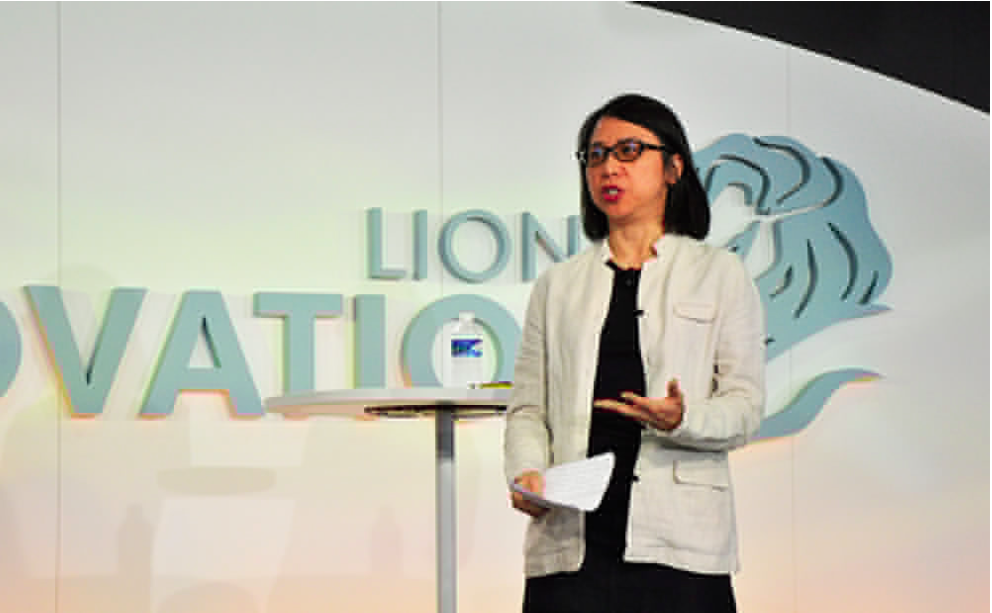
Lee and her partner promptly decided to close before wasting any more time and money. She finds less experienced startups are often not so clinical, “They have an issue with letting go, even though they know they are struggling…They tend to believe that there will be hope in a year or two.”
Lee credits the decisiveness and sound structuring of the business that mitigated a potentially more damaging venture to years of experience with a big corporation. She feels that many startups underestimate the value of such skills, dismissing big corporate life as “really boring”. Particularly important is profit and loss management, “In my experience, a lot of [startups] look at a cash basis. They don’t envision what next year is going to be like. There are no risk assessment skills.” To learn the fundamentals, she advises young entrepreneurs to find a senior corporate executive as a mentor. The alternative, she says, is potentially disastrous, “If you don’t do the fundamentals right from day one…years later it will turn around and bite you badly.”
In hindsight, Lee realized she had failed to leverage the broad skills, assets and experience she had accrued across her career, “I was just trying to do something different for the sake of being different”. She determined that her next venture must play to her strengths: through personal relationships and experience, she had a deep understanding of the pressure points for clients and agencies struggling to gain traction with consumers.
While there is no shortage of venture capitalists in China, their involvement usually stops at investment. Lee saw a gap for a financial partner that could also provide strategic resources-marketing industry contacts, experience and expertise-to help budding businesses to grow.
“Those companies who understand what we do are not looking for money. They are looking for something that their financial investors cannot provide”.
In February 2015, Lee founded withinlink, a boutique incubator based in Shanghai working with startup businesses creating products, solutions or services across four weak areas for marketeers and agencies in China: mobile, ecommerce, social and data.
Lee is not a venture capitalist and the money she invests is her own. Though withinlink does take buy equity in the startups, the sums paid are small compared to usual VC investments, anything from US$2000 to $200, 000, typically representing between 0. 6% and 5% of the companies. “Those companies who understand what we do are not looking for money,”she explains, “They are looking for something that their financial investors cannot provide”.
It is so far so good for the company. Its ten startups currently have a combined valuation of close to US$600m and withinlink’s ROI is close to 500% (based on current valuations). Earlier this year it partially exited one company to the tune of 250 times initial investment, while two other companies are set to go public next year. Lee’s team was able to transform two more from a “disasterous situation” into a healthy one while another recently completed a successful Indiegogo campaign.


These days, Lee receives dozens of applications from hopeful young entrepreneurs. The evaluation process begins with the founder, “their personality, charisma, how do they treat their business and their people”. The majority she finds either lack the requisite business management skills or are deaf to advice. Moreover, their thinking is often short term and money-driven, “They want money to get the valuation up in order to pitch to other investors. It’s not about a solid product. “She adds that, in China, a lot are in for the money. “The valuations are crazy. Once they get the valuation, they get the buzz, thinking ‘if BAT [Baidu, Alibaba or Tencent] buy me, I’ll be fine”
Lee parts with two final messages. She believes startup founders should invest their own money, as she has, to make them more accountable and determined to succeed. “If you don’t put your own money in, how are you going to convince other investors to put money in?”
Now on to her second startup, Lee says, “It’s never too late to start a company, as long as you have the determination to do it”. Does she have any regrets about the first effort and the money she lost? “I am glad I failed. If I hadn’t, I would not have the clarity that I needed for my second startup. The lessons I learned were worth so much more than the money.”
Swee Lynn Chong
Swee Lynn Chong has over 25 years of industry experience in China and the Asia Pacific region, with a proven track record in strategic corporate communications and branding for media, consumer and retail brands.
Before joining Withinlink, Swee Lynn was Managing Director, Corporate Communications at GroupM China, where she raised the corporate profile of GroupM to one of the most reputable brands in the industry in China.
She started her career at Batey Singapore and has worked at the Hutchison Whampoa Group, Nike Asia Pacific, and the SCMP Group in Hong Kong SAR where she was head of marketing and corporate communications before moving to Shanghai.
Roger Li
Roger Li has more than 20 years’ experience in human resources, organizational design, talent management, leadership development, internal communications and change management.
Prior to joining Withinlink, Roger was Chief Human Resources Officer of Millward Brown, a global leader in brand, media and communications research and consulting, for Africa, Middle-East and the Asia-Pacific Region.
He also held senior positions at GroupM China as Chief Talent Officer and at Burson-Marsteller Asia Pacific as Regional Managing Director, Human Resources.
